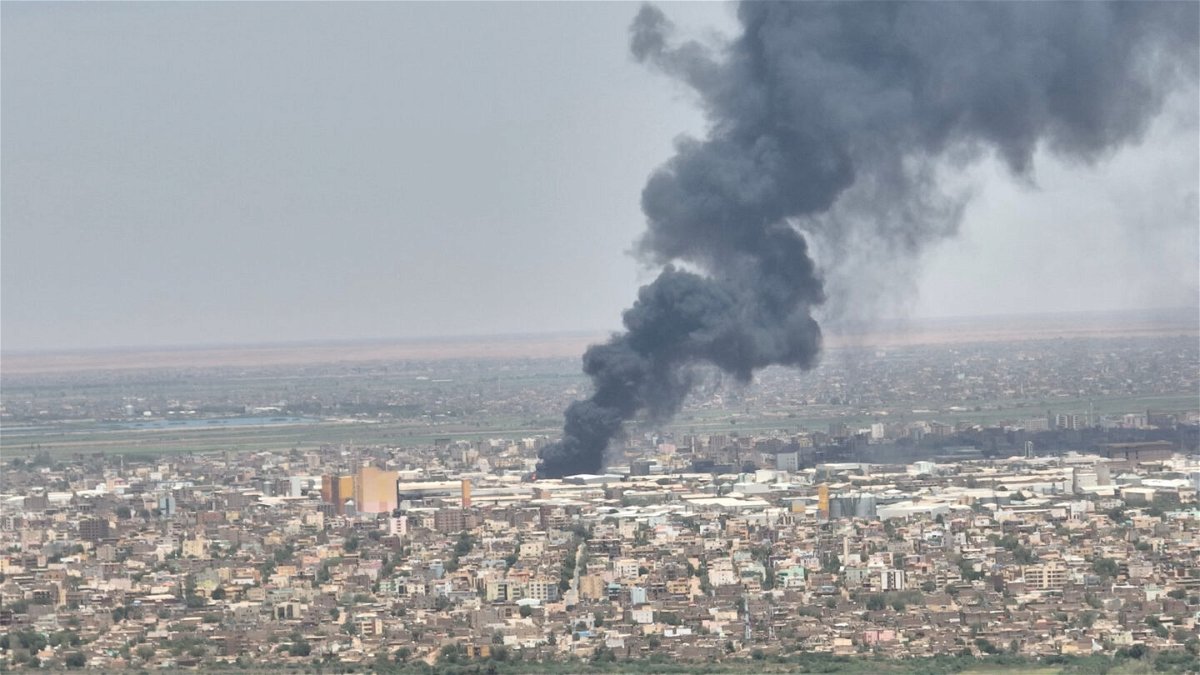US ‘cautiously optimistic’ agreement can be reached to allow humanitarian aid into Sudan

Drone footage shows clouds of black smoke over Bahri
By Jennifer Hansler, CNN
The United States is “cautiously optimistic” that there will be an agreement to allow humanitarian aid to get into Sudan, a top State Department official said Wednesday amid ongoing talks between the warring Sudanese military factions.
However, the US is also prepared to apply economic pressure to the parties “depending upon how the talks go,” and “there are” sanctions ready to go, Undersecretary of State for Political Affairs Victoria Nuland said at a Senate Foreign Relations Committee hearing Wednesday.
Intense fighting between the Rapid Support Forces (RSF) and the Sudanese Armed Forces (SAF) has left hundreds dead and thousands injured, caused tens of thousands to flee their homes and has left the country on the brink of a civil war and a massive humanitarian catastrophe. Several ceasefires between the parties have not yielded an end to the fighting.
Weeks after the fighting broke out, the leaders of the RSF and SAF agreed to send representatives to the Saudi city of Jeddah for “pre-negotiation talks” mediated by the US and Saudi Arabia.
“Our goal for these talks has been very narrowly focused. First securing agreement on a declaration of humanitarian principles and then getting a ceasefire that is long enough to facilitate the steady delivery of badly needed services,” Nuland said.
Nuland told lawmakers she had spoken with the US negotiators, led by US Ambassador to Sudan John Godfrey and Assistant Secretary of State for African Affairs Molly Phee, and described them as “cautiously optimistic” that the initial stage of talks would be successful.
“We can’t get anything done in Sudan, we can’t even restore a process in which civilians are participating until the violence stops and we get some aid in,” she said.
“We’re, as I said, cautiously optimistic that this first installment on getting humanitarian support in will allow us to get going in coming days,” Nuland said. “Then the ceasefire has to be more durable.”
Last week, President Joe Biden signed a new executive order authorizing sanctions on those “responsible for threatening the peace, security, and stability of Sudan; undermining Sudan’s democratic transition; using violence against civilians; or committing serious human rights abuses.”
No sanctions have been imposed yet under the new executive order, though Nuland claimed Wednesday that the potential of sanctions “had an effect on the parties being willing to come to Jeddah.”
“We have the sanctions tool now that can allow us to continue to pressure them,” she said, telling lawmakers that “there are” sanctions ready to be imposed if the decision is made to do so.
Nuland said that she, Secretary of State Antony Blinken and Assistant Secretary of State for African Affairs Molly Phee “have all been involved in ensuring that if we go in that direction, we don’t go there alone.”
The administration has faced charges that it did not do enough to hold the rival military leaders – the RSF’s Mohamed Hamdan Dagalo, known as Hemedti and the SAF’s Abdelfattah Al Burhan — accountable for their past crimes.
“This Sudan policy has been very difficult,” Nuland said Wednesday. She noted that the administration had put penalties in place after a 2021 coup by Burhan, and that the US had supported a framework meant to transition Sudan to civilian rule.
‘Path of war’
Nuland said that “there was incredible effort made, including by the Secretary himself” on how the RSF and SAF could integrate their forces into one military, but “unfortunately, they chose the path of war not the path of integration.”
The administration has also faced sharp criticisms that for seemingly being blindsided by the eruption of the conflict in Sudan and its subsequent failure to evacuate US citizens from the country after a military evacuation of the US Embassy in Khartoum.
US officials said they “facilitated” the evacuation of Americans on partner flights and overland convoys before finally organizing three convoys from Khartoum to Port Sudan. However, many Americans told CNN they felt they were given no guidance and left to navigate the situation on their own.
On Wednesday, Nuland said 1,300 Americans had departed Sudan and there were “small handfuls” who now wished to leave.
“As we have Americans who are more ready now than they were at the time that we were doing these overland convoys to get out, we’re giving them advice on various ways that they can do that, routes that are considered more safe,” said Nuland. “Were we to have a critical mass, a larger number that wanted to come out, we would look again at other options.”
Even as the US and international partners push to stop the fighting, a top official from the US Agency for International Development warned at the same hearing on Wednesday that the US’ “ability to sustain a robust (humanitarian) response in Sudan is going to be very challenged.”
“Even before this crisis, last year, we knew that Sudan was one of the most vulnerable countries in the world to Russia’s war in Ukraine because of how dependent it was on wheat imports,” said Sarah Charles, Assistant to the Administrator of USAID’s Bureau for Humanitarian Assistance.
“And so we’d already tried to scale up our assistance in Sudan and it was already going to be hard to sustain that this year giving competing demands,” Charles said.
The-CNN-Wire
™ & © 2023 Cable News Network, Inc., a Warner Bros. Discovery Company. All rights reserved.
CNN’s Michael Conte contributed to this report.